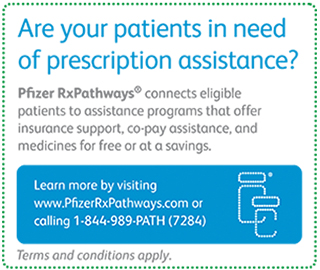BONE LOSS & MENOPAUSE
DID YOU KNOW THERE’S A CONNECTION
BETWEEN MENOPAUSE & BONE LOSS?
During menopause, your body loses estrogen (more on that here). And estrogen loss may lead to bone loss. Why? Because estrogens play an important role in building bones and keeping them strong.
The first few years of postmenopause, when your estrogen levels drop, is when bone loss usually occurs most rapidly. This can leave you at increased risk of developing osteoporosis, the most common bone disease.
If you use Duavee only to prevent osteoporosis due to menopause, talk with your doctor about whether a different treatment or medicine without estrogens might be better for you. Duavee should be taken for the shortest time possible and only for as long as treatment is needed.

Did you know?
- The more bone mass you lose, the more weak and brittle your bones may become
- Approximately 50% of women 50 years of age or older may have low bone mass
BONE LOSS & MENOPAUSE
DID YOU KNOW THERE’S A CONNECTION
BETWEEN MENOPAUSE & BONE LOSS?
During menopause, your body loses estrogen (more on that here). And estrogen loss may lead to bone loss. Why? Because estrogens play an important role in building bones and keeping them strong.
The first few years of postmenopause, when your estrogen levels drop, is when bone loss usually occurs most rapidly. This can leave you at increased risk of developing osteoporosis, the most common bone disease.
If you use Duavee only to prevent osteoporosis due to menopause, talk with your doctor about whether a different treatment or medicine without estrogens might be better for you. Duavee should be taken for the shortest time possible and only for as long as treatment is needed.

Did you know?
- The more bone mass you lose, the more weak and brittle your bones may become
- Approximately 50% of women 50 years of age or older may have low bone mass
IMPORTANT SAFETY INFORMATION
IMPORTANT SAFETY INFORMATION AND INDICATIONS
Do not take progestins, additional estrogens, or additional estrogen agonists/antagonists while taking Duavee® (conjugated estrogens/bazedoxifene).
Using estrogen alone may increase your chance of getting cancer of the uterus. Report any unusual vaginal bleeding right away while taking Duavee. Vaginal bleeding after menopause may be a warning sign of cancer of the uterus. A healthcare provider should check unusual vaginal bleeding to find the cause.
Do not use estrogens to prevent heart disease, heart attacks, strokes, or dementia.
Estrogen alone may increase the chance of getting blood clots or strokes.
Using estrogen alone may increase the chance of getting dementia, based on a study of women 65 years of age or older.
The risks listed above are based on a study of an estrogen-alone oral product. Since other products and doses have not been studied in the same way, it is not known how the use of Duavee will affect your chances of getting these conditions.
Estrogens should be used at the lowest dose possible, only for as long as needed. You and your healthcare provider should talk regularly about whether you still need treatment with Duavee.
Do not use Duavee if you: have or had blood clots; are allergic to estrogens or bazedoxifene, the active ingredients of Duavee; have unusual vaginal bleeding; have or had certain cancers (e.g., uterine or breast), liver problems, or bleeding disorders; or are pregnant.
If you take thyroid medication, consult your healthcare provider, as use of estrogens may change the amount needed.
Serious side effects include blood clots, stroke, heart attack, cancer of the lining of the uterus, breast cancer, cancer of the ovary, dementia, gallbladder problems, loss of vision, high blood pressure, increased fats in your blood, liver problems, thyroid problems, fluid retention, low calcium, swelling of your mouth or tongue, worsening of other medical problems such as asthma, diabetes, epilepsy, migraines, a genetic problem called porphyria, lupus and liver problems.
Call your healthcare provider right away if you have any of the following warning signs, or any other unusual symptoms that concern you: new breast lumps, unusual vaginal bleeding, changes in vision or speech, sudden new severe headaches, severe pains in your chest or legs with or without shortness of breath, weakness and fatigue.
Less serious, but common side effects include: muscle spasms, nausea, diarrhea, upset stomach, abdominal pain, throat pain, dizziness, neck pain.
INDICATIONS
Duavee is used after menopause for women with a uterus to reduce moderate to severe hot flashes and to help reduce the chances of developing osteoporosis (thin, weak bones).
If you use Duavee only to prevent osteoporosis due to menopause, talk with your healthcare provider about whether a different treatment or medicine without estrogens might be better for you.
Duavee should be taken for the shortest time possible and only for as long as treatment is needed. You and your healthcare provider should talk regularly about whether you still need treatment with Duavee.
Please see full Prescribing Information, including BOXED WARNING and Patient Information.
Patients should always ask their doctors for medical advice about adverse events.
You are encouraged to report adverse events related to Pfizer products by calling 1-800-438-1985 (U.S. only). If you prefer, you may contact the U.S. Food and Drug Administration (FDA) directly. Visit http://www.fda.gov/MedWatch or call 1-800-FDA-1088.
This site is intended only for U.S. residents. The products discussed in this site may have different product labeling in different countries. The information provided is for educational purposes only and is not intended to replace discussions with a healthcare provider.
Doctors may recommend alternative treatment options to their patients.





